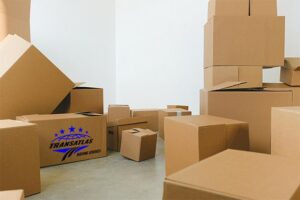The relocation process in Canada may be a stressful experience, but it all depends on
how you label your boxes. Packing and labelling correctly can keep your items safe and
make unloading much easier. You can know where things are, rather than ransacking the
random boxes when you get there. This assists movers in moving items to the right rooms
and prevents loss or damage of delicate items. Good labelling will help you a lot and make
your relocation far more organised, whether it is moving across the street or to a different
province.
Why Proper Labelling Matters
The majority of the population thinks that the act of moving involves putting stuff in boxes and
placing those boxes in a truck. But not having the labels on the boxes is actually a waste of time
trying to find what is in each box later. Even better, fragile items like dishes, glasses or electronics
may be broken unless movers know how to handle them. Labelling will also prevent confusion of
kitchen items with bedroom items. A labelled box is less time-consuming, less expensive and less
stressful as it is less complex to open and less risky.
Label Boxes by Room
The simplest method of organisation is to label the name of the room on each box. As an example:
Kitchen, Bedroom, Living Room. Once the movers offload, they can put each box in the right room.
This saves later heavy lifting and also ensures that your new house is clean from the very start. You
can even number rooms or use short names in a large house you are moving to prevent confusion.
Add Details of Items Inside
On the same card with the name of the room, name two or three important things. One such
example is as follows: Kitchen – Pots and Pans or bedroom – Winter Clothes. This helps you
to achieve what you desire in a limited time span without opening many boxes. This is quite
handy on your first night in a new house, where all you need to do is unpack the most important
things.

Use a Numbering System
It is also clever to number boxes. Label 1 box, 2 box, etc., and maintain a master list, either on
paper or on your phone. Record the box number on the list and all that is in it. When a box is lost,
you have no idea what was lost. This is quite useful in inter-Lake Canada movements.
Mark Fragile Items Clearly
FRAGILE should be written on the top and the sides of the box when handling delicate objects.
You can also provide arrows with This Side Up. Movers will be more careful when they are aware
that the contents are of special concern. They can be written on with bright tape or stickers to
attract attention to fragile boxes. This prevents the breaking of delicate items like glasses, plates or
even electronics.
Try Colour-Coding Labels
Labelling can be done more quickly by colour-coding. Each room can be done with colored tape
or stickers. For example red tape in the kitchen, blue in bedrooms, green in the living room and
yellow in the bathroom. Movers will not have to read all the labels and will only have to match
the colours with rooms. It is time-saving, and mistakes are avoided.
Label “Essentials” or “Open First” Boxes
You do not want to find toothbrushes, chargers, or nightclothes at the end of a hard day when you
are on the move. That is why you need to pack a couple of boxes marked with Essentials or Open
First. They should contain daily use products such as toiletries, medications, simple kitchen
supplies and clean clothes. You will be able to relax when you come here.
Final Thought
Labelling boxes might look like some unnecessary effort, but it will save your time and make
your relocation to Canada safer and free of worries. You can save time when unpacking by ticking
boxes, entering details of items and numbering or colouring them. Your delicate objects remain intact,
labourers can move faster, and your new residence is organised at the very beginning. A bit of labelling
will help you make your move less stressful.
FAQs
Where do I write the labels on the box?
Write on the top and at least one side of each box in such a way that it can be read
even when stacked.
Am I able to print labels as opposed to writing them?
Sure, printed labels are obvious and business-like, but a permanent marker will also
do the job.
Better than writing is colour-coding?
They are both useful, and they should be used together. Details are added with the help of
colours that save time.
Would it be better to write labels in English or French in Canada?
When you reside in a bilingual territory, it can be useful to use both languages so that movers
and family members can follow more quickly.
